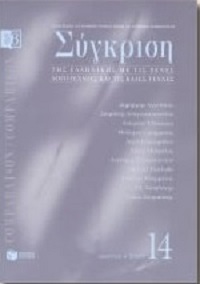Music and modern-Greek Enlighenment : Reconstruction of a dialogue
Abstract
This article is about the notions of secular music among the Greek writers of the 18th century. In broad lines, we may distinguish three tendencies: i) a progressive one, represented here by Eugenios Voulgaris, ii) a conservative one, whose main exponent was Nikodimos of Mount Athos (so-called Hagioritis), and iii) a «third-way» one represented by Chrysanthos of Madytos. Eugenios, a bishop who studied philosophy in Europe and lived in Russia, allows music to have a say not only on people's character but on their working-time, too. He is also tolerant towards instrumental music in every-day life as well as in worship,
which was (and still is) forbidden in the Orthodox Church. Nikodimos, on the other hand, a monk and sermon writer who did not travel abroad, rejects all sorts of music, if they do not serve the spiritual needs of the faithful. He scorns instruments, and is particularly severe against music as leisure, which he sees as corrupting the soul. Chrysanthos stands somewhere in-between them, as he was a musician himself and a music teacher at the Greek Patriarchate in Istanbul. He approaches music as a blessing from God, which should be exercised by human beings, though with caution, in order to prevent its ill-effects. This dialogue may be said to correspond with the «querelle des anciens et modems» which upset
Europe around the same time.
Article Details
- How to Cite
-
Πλεμμένος Γ. (2017). Music and modern-Greek Enlighenment : Reconstruction of a dialogue. Comparison, 14, 157–183. https://doi.org/10.12681/comparison.10122
- Issue
- Vol. 14 (2003)
- Section
- Articles

This work is licensed under a Creative Commons Attribution-NonCommercial-ShareAlike 4.0 International License.
Authors who publish with this journal agree to the following terms:
- Authors retain copyright and grant the journal right of first publication with the work simultaneously licensed under a Creative Commons Attribution Non-Commercial License that allows others to share the work with an acknowledgement of the work's authorship and initial publication in this journal.
- Authors are able to enter into separate, additional contractual arrangements for the non-exclusive distribution of the journal's published version of the work (e.g. post it to an institutional repository or publish it in a book), with an acknowledgement of its initial publication in this journal.
- Authors are permitted and encouraged to post their work online (preferably in institutional repositories or on their website) prior to and during the submission process, as it can lead to productive exchanges, as well as earlier and greater citation of published work (See The Effect of Open Access).



